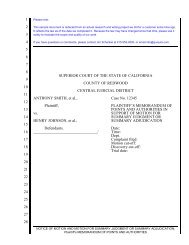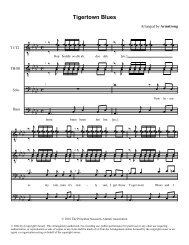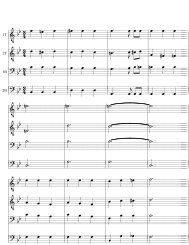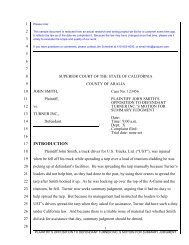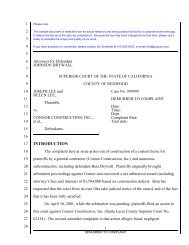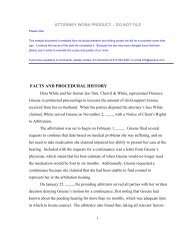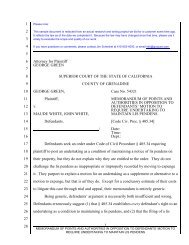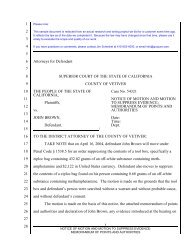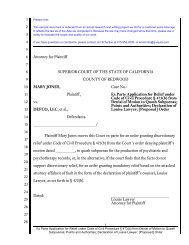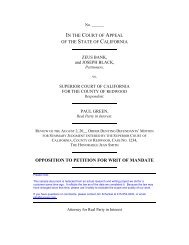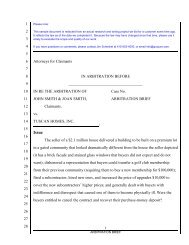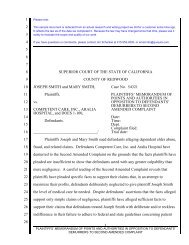demurrer - Quo Jure Corporation
demurrer - Quo Jure Corporation
demurrer - Quo Jure Corporation
You also want an ePaper? Increase the reach of your titles
YUMPU automatically turns print PDFs into web optimized ePapers that Google loves.
1<br />
2<br />
3<br />
4<br />
5<br />
6<br />
7<br />
8<br />
9<br />
10<br />
11<br />
12<br />
13<br />
14<br />
15<br />
16<br />
17<br />
18<br />
19<br />
20<br />
21<br />
22<br />
23<br />
24<br />
25<br />
26<br />
27<br />
28<br />
The day before Smith’s leave ended, Lee told her not to return to work because<br />
Dillon Construction could no longer accommodate her work restrictions. One month later<br />
he told her that her position had been filled, and Dillon Construction discharged her. She<br />
filed a timely complaint with the DFEH and received a right-to-sue letter.<br />
ARGUMENT<br />
1. Smith has exhausted her administrative remedies.<br />
Smith filed a timely DFEH complaint and received a right-to-sue letter. Complaint<br />
20. Dillon Construction, submitting copies of Smith’s DFEH and EEOC filings with<br />
their motion as Exhibits A & B, respectively, argues that these filings leave the First<br />
Amended Complaint incurably defective because they do not “specify” Smith’s charges<br />
against Dillon Construction. Not so. Smith’s administrative complaints satisfy FEHA<br />
and CFRA / FMLA notice requirements.<br />
The Court should reject this ground as to all causes of action because it rests on<br />
overly narrow standards for administrative complaints.<br />
A. Courts use a liberal “like or reasonably related” test determine the<br />
permissible scope of FEHA and related causes of action.<br />
FEHA mandates that its requirements “be construed liberally for the<br />
accomplishment of [its] purposes.” Gov’t Code § 12993(a); City of Moorpark v Superior<br />
Court (1998) 18 Cal 4th 1143, 1157. Similarly, within the Ninth Circuit, EEOC<br />
complaints must be construed “with the utmost liberality.” EEOC v. Farmer Bros. (1994)<br />
31 F.3d 891, 899; Deppe v. United Airlines (9 th Cir. 2000) 217 F.3d 1262, 1267, fn. 22.<br />
Neither FEHA nor analogous federal statutes delineate the standards for testing<br />
civil causes of action against administrative complaints, but California and federal courts<br />
concur that the purpose of the exhaustion requirement is to let the DFEH or the EEOC<br />
2<br />
PLAINTIFF’S MEMORANDUM OF POINTS AND AUTHORITIES IN OPPOSITION TO DEFENDANT<br />
DILLON CONSTRUCTION’S DEMURRER TO FIRST AMENDED COMPLAINT



